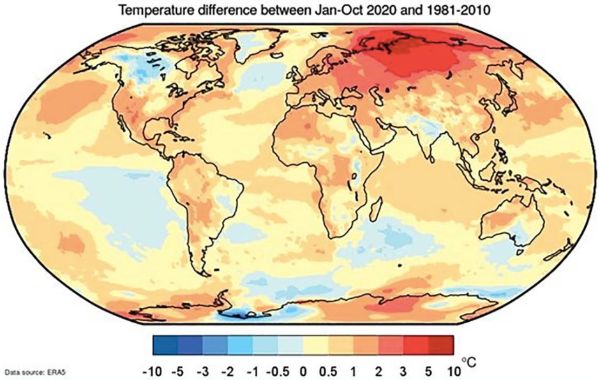2020 May Be Third Hottest Year On Record, World Could Hit Climate Change Milestone By 2024
Global pressure on wages from COVID-19 will not stop with the arrival of a vaccine, the head of the International Labour Organization (ILO) warned on Wednesday, coinciding with a major report showing how the pandemic had slowed or reversed a trend of rising wages across the world, hitting women workers and the low-paid hardest.
This year is on track to be one of the three hottest on record, completing a run of six years that were all hotter than any year ever measured before, the World Meteorological Organization (WMO) said on Wednesday.
The relentless rise of carbon dioxide levels in the atmosphere – a phenomenon that has continued despite a travel lull during the pandemic – will fuel temperature rise for decades to come.
“The average global temperature in 2020 is set to be about 1.2 °C above the pre-industrial (1850-1900) level. There is at least a one in five chance of it temporarily exceeding 1.5 °C by 2024”, WMO Secretary-General Petteri Taalas said in a statement.
Unwelcome threshold
The 1.5 degree threshold represents a milestone the world is trying not to reach: the 2015 Paris Agreement on climate change, backed by almost every country on earth, calls for keeping the global temperature to 1.5°C above pre-industrial era levels.
To slow temperature rises, the world needs radical action. Countries must decrease production of fossil fuels by 6 per cent per year between 2020 and 2030 if the world is to avert "catastrophic” global temperature rise, according to the UN-backed Production Gap Reportreleased on Wednesday.
In a landmark speech in New York on Wednesday, UN Secretary-General António Guterres said the fight against the climate crisis was the top priority for the 21st Century.
Climate records have fallen like dominos in the past decade, so notching up merely the third hottest year on record may seem to suggest some respite. But that would be a false conclusion, because 2020’s heat rose in a year when the world was experiencing a La Niña weather pattern, which normally means lower temperatures.
Counter-intuitive
“Record warm years have usually coincided with a strong El Niño event, as was the case in 2016. We are now experiencing a La Niña, which has a cooling effect on global temperatures, but has not been sufficient to put a brake on this year’s heat. Despite the current La Niña conditions, this year has already shown near record heat comparable to the previous record of 2016,” said Prof. Taalas.
“We saw new extreme temperatures on land, sea and especially in the Arctic. Wildfires consumed vast areas in Australia, Siberia, the US West Coast and South America, sending plumes of smoke circumnavigating the globe”, he added.
“We saw a record number of hurricanes in the Atlantic, including unprecedented back-to-back category 4 hurricanes in Central America in November. Flooding in parts of Africa and South East Asia led to massive population displacement and undermined food security for millions.”
The 2020 temperature report is provisional until a final report is published in March 2021, the WMO said.



 ChildFund New Zealand: Back To School? Not Without Clean Water
ChildFund New Zealand: Back To School? Not Without Clean Water UNRWA: West Bank Violence Undermining Gaza Ceasefire
UNRWA: West Bank Violence Undermining Gaza Ceasefire UNDP Pacific Office in Fiji: Study Tour To Deepen Efforts To Prevent, Investigate, And Prosecute Corruption In The Pacific
UNDP Pacific Office in Fiji: Study Tour To Deepen Efforts To Prevent, Investigate, And Prosecute Corruption In The Pacific APEC: Reaching Every Corner - Why Financial Inclusion Must Go Beyond Bank Accounts
APEC: Reaching Every Corner - Why Financial Inclusion Must Go Beyond Bank Accounts UN News: Diplomacy Key To Ending Crisis In Eastern DR Congo - UN Peacekeeping Chief
UN News: Diplomacy Key To Ending Crisis In Eastern DR Congo - UN Peacekeeping Chief CIVICUS: ASEAN - End Complicity With Myanmar Junta, Demand Democracy And Human Rights
CIVICUS: ASEAN - End Complicity With Myanmar Junta, Demand Democracy And Human Rights 